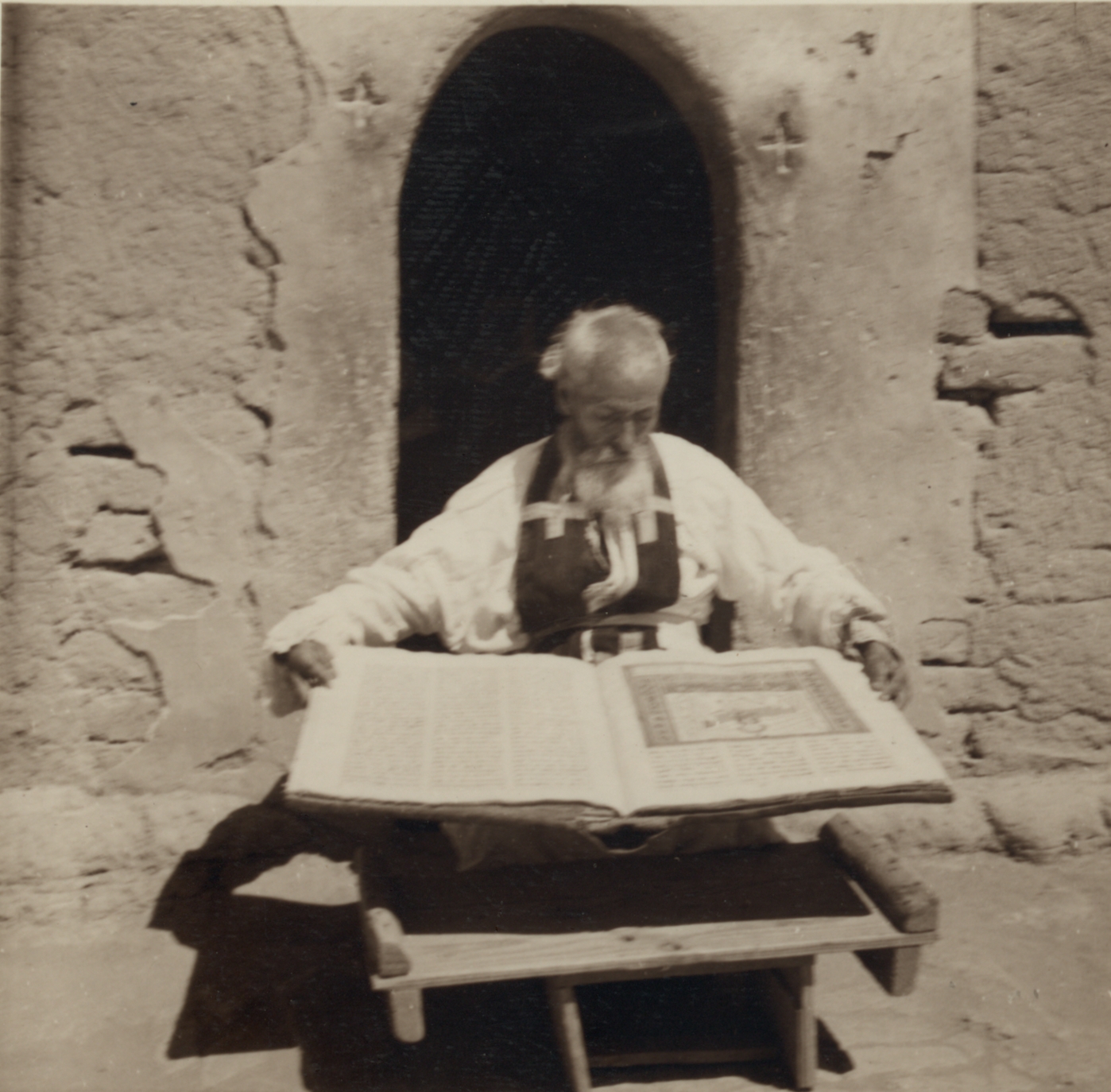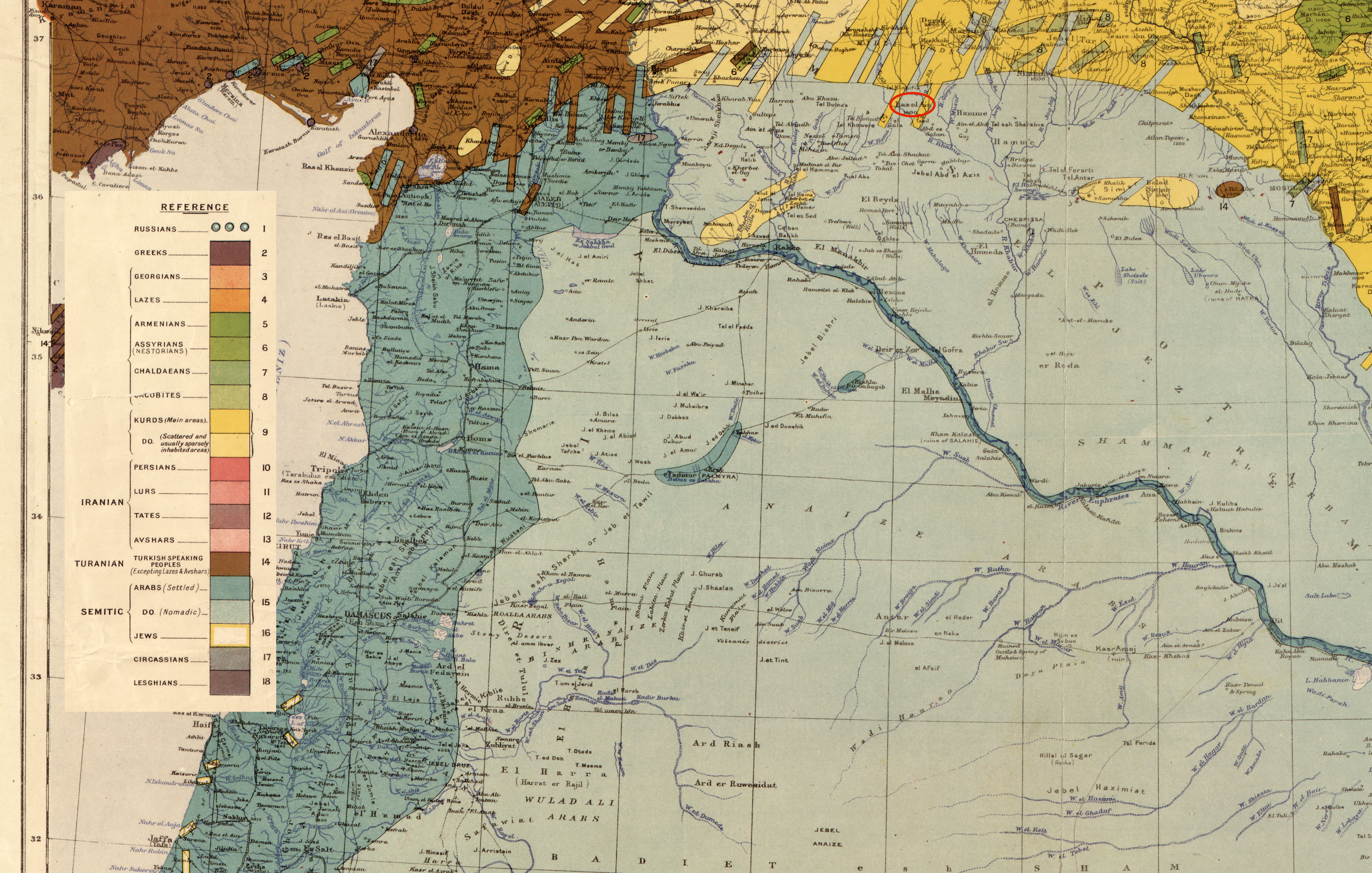|
Al-Manajir
al-Manajir ( ar, المناجير, ku, مەناجیر , Menacîr), often referred to as Manajir, Manajer or Manjar, is a town in northwestern al-Hasakah Governorate, northeastern Syria. At the 2004 census, al-Manajir had a population of 12,156. Geography al-Manajir lies on the right (southern) bank of the Khabur River in the midst of the fertile agricultural area of the Upper Khabur Valley, located around southeast of Ras al-Ayn and west of Tell Tamer. It administratively belongs to the Ras al-Ayn Subdistrict. History al-Manajir had an Assyrian majority with Kurdish and Arab minorities, until in 1973 Syrian president Hafez al-Assad commenced a large-scale settlement program, systematically settling Bedouins in the areas bordering Iraq and Syria to weaken the demographic dominance of the Kurds and keep the area under tighter control. After the best plots of land were redistributed to settlers of the Baggara tribe, it is said that most of the original inhabitants left the ... [...More Info...] [...Related Items...] OR: [Wikipedia] [Google] [Baidu] |
Free Syrian Army
The Free Syrian Army (FSA) ( ar, الجيش السوري الحر, al-jaysh as-Sūrī al-ḥur) is a loose faction in the Syrian Civil War founded on 29 July 2011 by officers of the Syrian Armed Forces with the goal of bringing down the government of Bashar al-Assad. (Pages 6, 14–17.) Initially a formal organization at its founding, its structure gradually dissipated by late 2012, and the FSA identity has since been used by various opposition groups. In late 2011, the FSA was considered the main Syrian military defectors group. It had success against far better equipped government forces. From July 2012 onward, the group was weakened by decreasing discipline, growing Inter-rebel conflict during the Syrian Civil War, infighting, and a lack of funding, while Syrian opposition#Other groups affiliated with Syrian opposition, Islamist groups became dominant within the armed opposition. The Free Syrian Army aims to be "the military wing of the Syrian people's opposition to the regi ... [...More Info...] [...Related Items...] OR: [Wikipedia] [Google] [Baidu] |
Al-Hasakah Governorate
Al-Hasakah Governorate ( ar, محافظة الحسكة, Muḥāfaẓat al-Ḥasakah, ku, Parêzgeha Hesekê}, syc, ܗܘܦܪܟܝܐ ܕܚܣܟܗ, Huparkiyo d'Ḥasake, also known as syc, ܓܙܪܬܐ, Gozarto) is one of the fourteen governorates (provinces) of Syria. It is located in the far north-east corner of Syria and distinguished by its fertile lands, plentiful water, natural environment, and more than one hundred archaeological sites. It was formerly known as Al-Jazira Province. Prior to the Syrian Civil War nearly half of Syria's oil was extracted from the region. It is the lower part of Upper Mesopotamia. Geography During the Abbasid era, the area that makes this province used to be part of the Diyar Rabi'a administrative unit, corresponding to the southern part of Upper Mesopotamia. Kurdistan did not include the lands of Syrian Jazira. The Treaty of Sèvres' putative Kurdistan did not include any part of today's Syria. Political history The French, following the Otto ... [...More Info...] [...Related Items...] OR: [Wikipedia] [Google] [Baidu] |
List Of Sovereign States
The following is a list providing an overview of sovereign states around the world with information on their status and recognition of their sovereignty. The 206 listed states can be divided into three categories based on membership within the United Nations System: 193 UN member states, 2 UN General Assembly non-member observer states, and 11 other states. The ''sovereignty dispute'' column indicates states having undisputed sovereignty (188 states, of which there are 187 UN member states and 1 UN General Assembly non-member observer state), states having disputed sovereignty (16 states, of which there are 6 UN member states, 1 UN General Assembly non-member observer state, and 9 de facto states), and states having a special political status (2 states, both in free association with New Zealand). Compiling a list such as this can be a complicated and controversial process, as there is no definition that is binding on all the members of the community of nations concerni ... [...More Info...] [...Related Items...] OR: [Wikipedia] [Google] [Baidu] |
Assyrians In Syria
Assyrians in Syria ( syr, ܐܬܘܪܝܐ ܕܣܘܪܝܐ, ar, الآشوريون في سوريا) are an ethnic and linguistic minority that are Indigenous peoples, indigenous to Upper Mesopotamia (known in Syriac as ''Gozarto'') which is the name used for the Upland and lowland, uplands and great outwash plain of northwestern Iraq, northeastern Syria and southeastern Turkey. Syrian-Assyrians are people of Assyrian people, Assyrian descent living in Syria, and those in the Assyrian diaspora who are of Syrian-Assyrian heritage. They live primarily in Al-Hasakah Governorate, with a significant presence in Hasakah city and the cities of Qamishli, Al-Malikiyah, Malikiyah, Ras al-Ayn, and Al-Qahtaniyah, al-Hasakah Governorate, Qahtaniyah, as well as in Tell Tamer and nearby villages. Some have migrated to Damascus and other western cities. They share a common history and Assyrian identity, ethnic identity, rooted in shared Syriac language, linguistic, Assyrian culture, cultural and Syriac ... [...More Info...] [...Related Items...] OR: [Wikipedia] [Google] [Baidu] |
Battle Of Ras Al-Ayn
A battle is an occurrence of combat in warfare between opposing military units of any number or size. A war usually consists of multiple battles. In general, a battle is a military engagement that is well defined in duration, area, and force commitment. An engagement with only limited commitment between the forces and without decisive results is sometimes called a skirmish. The word "battle" can also be used infrequently to refer to an entire operational campaign, although this usage greatly diverges from its conventional or customary meaning. Generally, the word "battle" is used for such campaigns if referring to a protracted combat encounter in which either one or both of the combatants had the same methods, resources, and strategic objectives throughout the encounter. Some prominent examples of this would be the Battle of the Atlantic, Battle of Britain, and Battle of Stalingrad, all in World War II. Wars and military campaigns are guided by military strategy, whereas bat ... [...More Info...] [...Related Items...] OR: [Wikipedia] [Google] [Baidu] |
Ras Al-Ayn
Ras al-Ayn ( ar, رَأْس ٱلْعَيْن, Raʾs al-ʿAyn, ku, سەرێ کانیێ, Serê Kaniyê, syc, ܪܝܫ ܥܝܢܐ, Rēš Aynā), also spelled Ras al-Ain, is a city in al-Hasakah Governorate in northeastern Syria, on the Syria–Turkey border. One of the oldest cities in Upper Mesopotamia, the area of Ras al-Ayn has been inhabited since at least the Neolithic age ( 8,000 BC). Later known as the ancient Aramean city of Sikkan, the Roman city of Rhesaina, and the Byzantine city of Theodosiopolis, the town was destroyed and rebuilt several times, and in medieval times was the site of fierce battles between several Muslim dynasties. With the 1921 Treaty of Ankara, Ras al-Ayn became a divided city when its northern part, today's Ceylanpınar, was ceded to Turkey. With a population of 29,347 (), it is the third largest city in al-Hasakah Governorate, and the administrative center of Ras al-Ayn District. During the civil war, the city became contested between Syrian o ... [...More Info...] [...Related Items...] OR: [Wikipedia] [Google] [Baidu] |
Syrian Army
" (''Guardians of the Homeland'') , colors = * Service uniform: Khaki, Olive * Combat uniform: Green, Black, Khaki , anniversaries = August 1st , equipment = , equipment_label = , battles = 1948 Arab–Israeli War Six-Day War War of Attrition Black September Yom Kippur War Lebanese Civil War 1982 Lebanon War Islamist uprising in Syria Mountain War (Lebanon) Operation Desert Storm Syrian Civil War , decorations = , battle_honours = , battle_honours_label = , disbanded = , website = , commander1 = Marshal Bashar al-Assad , commander1_label =President of Syria , commander2 = Gen. Ali Mahmoud Abbas , commander2_label = Minister of Defense , commander3 = Gen. Abdul Karim Mahmoud Ibrahim , commander3_label = Chief of the General Staff , notable_commanders = , identification_symbol = , identification_symbol_label = , identification_symbol_2 = , identification_symbol_2_label = The Syrian Army, officially the Syrian Arab Army (SAA) ( a ... [...More Info...] [...Related Items...] OR: [Wikipedia] [Google] [Baidu] |
Le Monde Diplomatique
''Le Monde diplomatique'' (meaning "The Diplomatic World" in French) is a French monthly newspaper offering analysis and opinion on politics, culture, and current affairs. The publication is owned by Le Monde diplomatique SA, a subsidiary company of ''Le Monde'' which grants it complete editorial autonomy. Worldwide there were 71 editions in 26 other languages (including 38 in print for a total of about 2.2 million copies and 33 electronic editions). History 1954–1989 ''Le Monde diplomatique'' was founded in 1954 by Hubert Beuve-Méry, founder and director of ''Le Monde'', the French newspaper of record. Subtitled the "organ of diplomatic circles and of large international organisations," 5,000 copies were distributed, comprising eight pages, dedicated to foreign policy and geopolitics. Its first editor in chief, François Honti, developed the newspaper as a scholarly reference journal. Honti attentively followed the birth of the Non-Aligned Movement, created out of the 1955 ... [...More Info...] [...Related Items...] OR: [Wikipedia] [Google] [Baidu] |
Baggara
The Baggāra ( ar, :wikt:بقار#Etymology 2, البَقَّارَة "heifer herder") or Chadian Arabs are a Nomad, nomadic confederation of people of mixed Arabs, Arab and Arabization, Arabized Indigenous peoples of Africa, indigenous African ancestry, inhabiting a portion of the Sahel mainly between Lake Chad and the Nile, Nile river near south Kordofan, numbering over six million. They are known as Baggara and Abbala in Sudan, and as Shuwa Arabs in Cameroon, Nigeria and Western Chad. The term Shuwa is said to be of Kanuri language, Kanuri origin. The Baggāra mostly speak their distinct dialect, known as Chadian Arabic. However the Baggāra of Southern Kordofan, due to contact with the sedentary population and the Sudanese Arab camel herders of Kordofan, has led to some Sudanese Arabic influence on the dialect of that zone. They also have a common traditional mode of subsistence, nomadic cattle herding, although nowadays many lead a settled existence. Nevertheless, collectivel ... [...More Info...] [...Related Items...] OR: [Wikipedia] [Google] [Baidu] |
Iraq
Iraq,; ku, عێراق, translit=Êraq officially the Republic of Iraq, '; ku, کۆماری عێراق, translit=Komarî Êraq is a country in Western Asia. It is bordered by Turkey to Iraq–Turkey border, the north, Iran to Iran–Iraq border, the east, the Persian Gulf and Kuwait to the southeast, Saudi Arabia to the south, Jordan to Iraq–Jordan border, the southwest and Syria to Iraq–Syria border, the west. The Capital city, capital and largest city is Baghdad. Iraq is home to diverse ethnic groups including Iraqi Arabs, Kurds, Iraqi Turkmen, Turkmens, Assyrian people, Assyrians, Armenians in Iraq, Armenians, Yazidis, Mandaeans, Iranians in Iraq, Persians and Shabaks, Shabakis with similarly diverse Geography of Iraq, geography and Wildlife of Iraq, wildlife. The vast majority of the country's 44 million residents are Muslims – the notable other faiths are Christianity in Iraq, Christianity, Yazidism, Mandaeism, Yarsanism and Zoroastrianism. The official langu ... [...More Info...] [...Related Items...] OR: [Wikipedia] [Google] [Baidu] |
Bedouins
The Bedouin, Beduin, or Bedu (; , singular ) are nomadic Arabs, Arab tribes who have historically inhabited the desert regions in the Arabian Peninsula, North Africa, the Levant, and Mesopotamia. The Bedouin originated in the Syrian Desert and Arabian Desert but spread across the rest of the Arab world in Western Asia, West Asia and North Africa after the spread of Islam. The English word ''bedouin'' comes from the Arabic ''badawī'', which means "desert dweller", and is traditionally contrasted with ''ḥāḍir'', the term for Sedentism, sedentary people. Bedouin territory stretches from the vast deserts of North Africa to the rocky sands of the Middle East. They are traditionally divided into tribes, or clans (known in Arabic as ''ʿašāʾir''; or ''qabāʾil'' ), and historically share a common culture of herding camels and goats. The vast majority of Bedouins adhere to Islam, although there are some fewer numbers of Arab Christians, Christian Bedouins present in the Fe ... [...More Info...] [...Related Items...] OR: [Wikipedia] [Google] [Baidu] |






